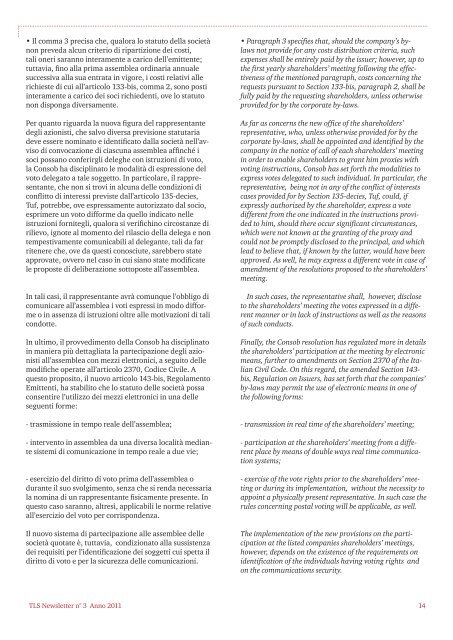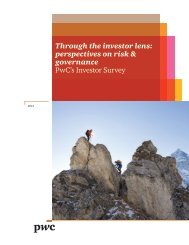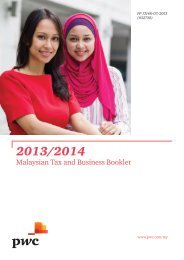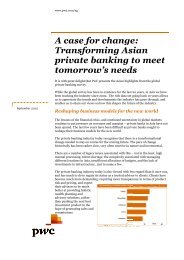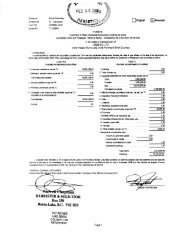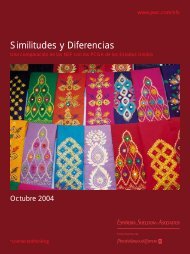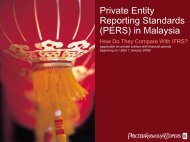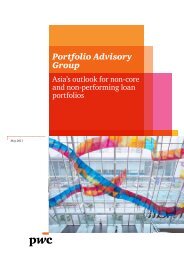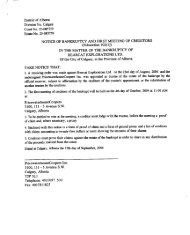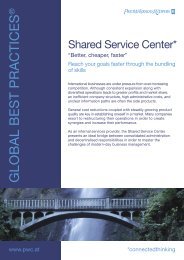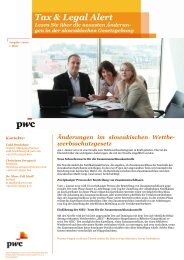TLS Newsletter 11 marzo 2011 - PwC
TLS Newsletter 11 marzo 2011 - PwC
TLS Newsletter 11 marzo 2011 - PwC
Create successful ePaper yourself
Turn your PDF publications into a flip-book with our unique Google optimized e-Paper software.
• Il comma 3 precisa che, qualora lo statuto della società<br />
non preveda alcun criterio di ripartizione dei costi,<br />
tali oneri saranno interamente a carico dell’emittente;<br />
tuttavia, fino alla prima assemblea ordinaria annuale<br />
successiva alla sua entrata in vigore, i costi relativi alle<br />
richieste di cui all’articolo 133-bis, comma 2, sono posti<br />
interamente a carico dei soci richiedenti, ove lo statuto<br />
non disponga diversamente.<br />
Per quanto riguarda la nuova figura del rappresentante<br />
degli azionisti, che salvo diversa previsione statutaria<br />
deve essere nominato e identificato dalla società nell’avviso<br />
di convocazione di ciascuna assemblea affinché i<br />
soci possano conferirgli deleghe con istruzioni di voto,<br />
la Consob ha disciplinato le modalità di espressione del<br />
voto delegato a tale soggetto. In particolare, il rappresentante,<br />
che non si trovi in alcuna delle condizioni di<br />
conflitto di interessi previste dall’articolo 135-decies,<br />
Tuf, potrebbe, ove espressamente autorizzato dal socio,<br />
esprimere un voto difforme da quello indicato nelle<br />
istruzioni fornitegli, qualora si verifichino circostanze di<br />
rilievo, ignote al momento del rilascio della delega e non<br />
tempestivamente comunicabili al delegante, tali da far<br />
ritenere che, ove da questi conosciute, sarebbero state<br />
approvate, ovvero nel caso in cui siano state modificate<br />
le proposte di deliberazione sottoposte all’assemblea.<br />
In tali casi, il rappresentante avrà comunque l’obbligo di<br />
comunicare all’assemblea i voti espressi in modo difforme<br />
o in assenza di istruzioni oltre alle motivazioni di tali<br />
condotte.<br />
In ultimo, il provvedimento della Consob ha disciplinato<br />
in maniera più dettagliata la partecipazione degli azionisti<br />
all’assemblea con mezzi elettronici, a seguito delle<br />
modifiche operate all’articolo 2370, Codice Civile. A<br />
questo proposito, il nuovo articolo 143-bis, Regolamento<br />
Emittenti, ha stabilito che lo statuto delle società possa<br />
consentire l’utilizzo dei mezzi elettronici in una delle<br />
seguenti forme:<br />
- trasmissione in tempo reale dell’assemblea;<br />
- intervento in assemblea da una diversa località mediante<br />
sistemi di comunicazione in tempo reale a due vie;<br />
- esercizio del diritto di voto prima dell’assemblea o<br />
durante il suo svolgimento, senza che si renda necessaria<br />
la nomina di un rappresentante fisicamente presente. In<br />
questo caso saranno, altresì, applicabili le norme relative<br />
all’esercizio del voto per corrispondenza.<br />
Il nuovo sistema di partecipazione alle assemblee delle<br />
società quotate è, tuttavia, condizionato alla sussistenza<br />
dei requisiti per l’identificazione dei soggetti cui spetta il<br />
diritto di voto e per la sicurezza delle comunicazioni.<br />
• Paragraph 3 specifies that, should the company’s bylaws<br />
not provide for any costs distribution criteria, such<br />
expenses shall be entirely paid by the issuer; however, up to<br />
the first yearly shareholders’ meeting following the effectiveness<br />
of the mentioned paragraph, costs concerning the<br />
requests pursuant to Section 133-bis, paragraph 2, shall be<br />
fully paid by the requesting shareholders, unless otherwise<br />
provided for by the corporate by-laws.<br />
As far as concerns the new office of the shareholders’<br />
representative, who, unless otherwise provided for by the<br />
corporate by-laws, shall be appointed and identified by the<br />
company in the notice of call of each shareholders’ meeting<br />
in order to enable shareholders to grant him proxies with<br />
voting instructions, Consob has set forth the modalities to<br />
express votes delegated to such individual. In particular, the<br />
representative, being not in any of the conflict of interests<br />
cases provided for by Section 135-decies, Tuf, could, if<br />
expressly authorized by the shareholder, express a vote<br />
different from the one indicated in the instructions provided<br />
to him, should there occur significant circumstances,<br />
which were not known at the granting of the proxy and<br />
could not be promptly disclosed to the principal, and which<br />
lead to believe that, if known by the latter, would have been<br />
approved. As well, he may express a different vote in case of<br />
amendment of the resolutions proposed to the shareholders’<br />
meeting.<br />
In such cases, the representative shall, however, disclose<br />
to the shareholders’ meeting the votes expressed in a different<br />
manner or in lack of instructions as well as the reasons<br />
of such conducts.<br />
Finally, the Consob resolution has regulated more in details<br />
the shareholders’ participation at the meeting by electronic<br />
means, further to amendments on Section 2370 of the Italian<br />
Civil Code. On this regard, the amended Section 143bis,<br />
Regulation on Issuers, has set forth that the companies’<br />
by-laws may permit the use of electronic means in one of<br />
the following forms:<br />
- transmission in real time of the shareholders’ meeting;<br />
- participation at the shareholders’ meeting from a different<br />
place by means of double ways real time communication<br />
systems;<br />
- exercise of the vote rights prior to the shareholders’ meeting<br />
or during its implementation, without the necessity to<br />
appoint a physically present representative. In such case the<br />
rules concerning postal voting will be applicable, as well.<br />
The implementation of the new provisions on the participation<br />
at the listed companies shareholders’ meetings,<br />
however, depends on the existence of the requirements on<br />
identification of the individuals having voting rights and<br />
on the communications security.<br />
<strong>TLS</strong> <strong>Newsletter</strong> n° 3 Anno 20<strong>11</strong> 14


